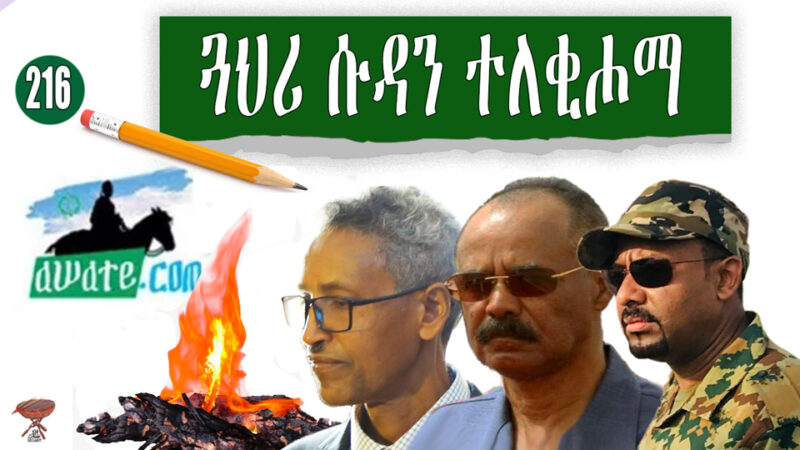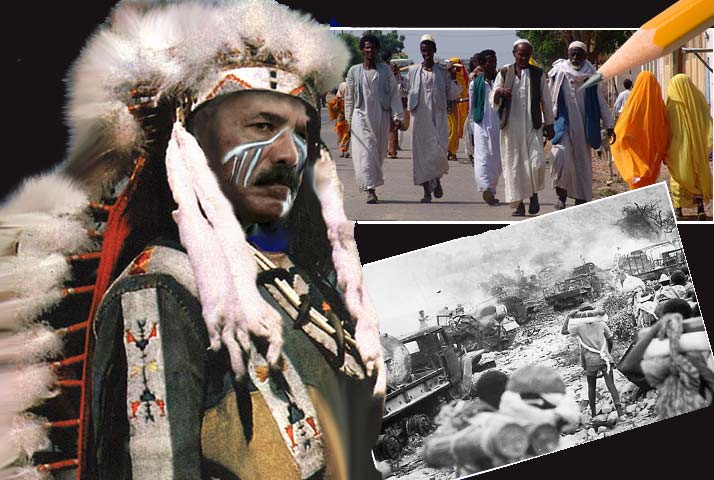Sudan Borrowed the Coal Fire From Ethiopia
The events that have damaged Eritrea, Ethiopia, Sudan, and Somalia for decades is still devastating the entire region. While some of those in power leave others fixed to the chairs and don’t seem to be leaving at all. Sadly, the people who have no power, die, kill, lose their properties, and jump from one confrontation to another, just to protect or to replace the powerful with another powerful individual or group. The people exert little efforts to be in control of their destiny. But those in power like the statuesque because it works for them. They don’t want to be bothers with spreading peace, assuring that the people they rule enjoy a dignified life, or establish rule of low. It has been too long since the people of the Horn of Africa chose to be the enemies of themselves, and the suffering continue with no end.
Currently, Eritreans wishing to avoid the forceful conscription and flee the country have to pay smugglers between $4,000 and $5,000. Those who have relatives in the Diaspora help pay the amount through middlemen residing all over the world. Part of the fees are paid in advance and the remaining part is paid after the escapees reach their destination in Ethiopia. The routes are through southern Eritrea, to West Tigrai and finally Addis Ababa. However, there are many who were stranded along the way for different reasons.
According to a resident in Gondar, “The Ethiopian immigration authorities either don’t want to control their borders or are unable to do so.”
Well-connected escapees from Eritrea do not have to be smuggled. Instead, they comfortably travel to Addis Ababa on Ethiopian Airlines that operates three flights daily out of Asmara. Most of those who travel to Addis Ababa are unusually large number of people seeking medical attention who can afford the needed money to pay for bribes to secure travel clearances. The process of acquiring a license requires going through a maze of bureaucracy carrying an application paper that must first be signed by the unit leader for soldiers, or neighborhood (Kebelle) officers, for civilians. The authorities who sign the paper are scattered in offices located in different cities and camps. Finally, Dr. Haile Mihtsun, the senior representative of the Eritrean ministry of health issues the license.
Entangled in a precarious security situation, Ethiopian cities are overwhelmed by heavy presence of militias and government security forces. The Ethiopian government has failed in curtailing the rampant corruption that has infected all government ministries. And the gap between the poor and rich has not been this wide in remembered history. “Looking at the lifestyles of the rich in the large cities, particularly Addis Ababa, it seems as if Ethiopia has escaped poverty.” However, the number of beggars, looting, and destitute internally displaced families in the streets tell a different story. The US Dollar which official trades for 50 Ethiopian Birr is now trading for 102. And it is on a free-fall.
Federal Budgets have been restored for Tigray and the banks are slowly being brought to the prewar liquidity levels. Yet, all over Ethiopia, price hikes and lack of supplies are putting unimaginable pressure on the middle-class and lower-class population. Ethiopia’s foreign currency reserve is depleted, and the “financial difficulty is crushing what is left of the economy”.
While businesspeople blame the lack of able economists and financial planners in the state institutions, the IMF and donor states led by the USA seems committed to alleviate the hardships. However, nothing will save Ethiopia from the predictable devaluation of the Birr.
External financial support might ameliorate the short-term hardships, but with a country being run by kleptocrats and Machiavellian disciples, long-term solutions may be further than the horizon.
The internecine wars and traditional enmity between ethnic groups is tearing the country apart and do not show signs of abetting. The cycle of fires of violence is extinguished in one locality only to be reignited in another. At the moment, there is an incipient crisis simmering in the Gurage zone whose people are known traders who can only thrive in times of peace. Now the area is distressed, and some are demanding a separate region in a country that has more than eighty “nations and nationalities.”
Security situation is precarious, and communities are paying dearly for the reckless adventures of their elite. Ethiopians in general and their Diaspora communities in particularly are not helping the situation; most do not have qualms in preaching and spreading chauvinism, hate-speech, and violence targeting their respective birth regions. Just like in Ethiopia, the Diaspora is divided along ethnic lines in the heart of democratic nations. Worse, a sizable number of the clergy have neglected their spiritual role and parishes and have become partisan activists massaging populist sentiments using the religion-card to ignite unrest. That is made worse by some groups who believe they have a divine mandate to lord over the other Ethiopians whom they look down to.
If a quick political settlement is not found soon, the Prosperity Party running Ethiopia is likely to implode taking the country down with it. The security situation in Ethiopia, particularly Addis Ababa, has long surpassed the level of acuteness that the city witnessed in 2005.
Last week, a high-level Eritrean military delegation headed by Brigadier General Abraha Kassa, the head of the Eritrean intelligence department, visited Ethiopia. The delegation toured key institutions including the Ethiopian Artificial Intelligence Institute (EAII), Information Network Security Agency (INSA), and the Federal police headquarters, in addition to the Millennium Dam (GERD).
According to a tweet by Yemane Gebremeskel, the Eritrean Minister of information, the Eritrean delegation’s visit was to further consolidate the close military cooperation between Ethiopia and Eritrea.
The Eritrean delegation was composed of veteran military commanders who are not known to be decision makers, except Brigadier General Abraha Kassa, the head of the delegation and Eritrea’s intelligence chief. The General was sanctioned by the US in 2021 for being responsible, or complicit, in the Ethiopian civil war.
Observers believe the Eritrean government is trying to adjust its position with the constantly changing Ethiopian political landscape. That was triggered when it realized the imminent standoff between the Amhara nationalists and the Federal government. Both have been its close allies since 2018 when the three decided to wipe out the TPLF, the archenemy of the Eritrean ruling party that controlled Tigray.
In a dramatic twist in November of 2022, the TPLF and the federal Ethiopian government reconciled in Pretoria. That move made the restless Amhara region’s elite to become more aggressive. They have launched populist media onslaught inside and outside Ethiopia against both Prime Minister Abiy Ahmed’s Prosperity Party, and the Federal Government. Last week the conflict has escalated to dangerous levels, but it seems the federal forces are gaining military as well as diplomatic success in winning members of the lethal Fano paramilitary Amhara peasant forces. However, the usual violent demons might shift the conflict to another regions.
It’s not clear if the Eritrean delegation’s visit was related to the escalation of conflicts between the Ethiopian federal state forces and the Amhara regional forces. However, the fact that the escalation coincided with the visit proves the Eritrean intelligence is worried of the grave consequences of a conflict between its two Ethiopian allies.
It’s believed that Isaias Afwerki does not have any other choice but remain a careful spectator and before supporting one of his allies against the other. However, unless there are serious pressures that prevent him from interfering, “his support of one side against the other could be critical.”
Trickling information coming out of Eritrea tell stories of a simmering conflict within the Eritrean defense forces; some commanders are shyly expressing their reluctance to be engaged in the inter-Ethiopian conflict, again, when the government has not yet announced the names of its killed soldiers in the Ethiopian civil war. However, sources close to the government indicate “the Eritrean government is heavily vested and entangled in the Ethiopian crisis, that any action it takes will have dangerous consequences.”
Many Eritrean politicians think the feelings and sentiments of the commanders is insignificant; historically they are always concerned more with partisan than national causes. But since “the PFDJ has a perpetual adrenaline rush and its preferred diplomacy is brinkmanship,” the future of Eritrea remains unpredictable.



Awate Forum